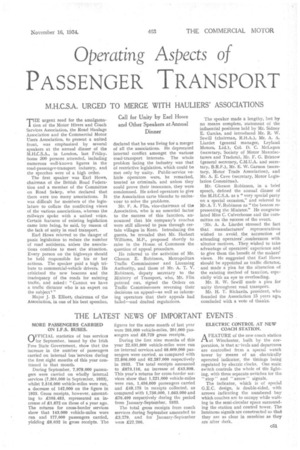Operating Aspects of
Page 117

If you've noticed an error in this article please click here to report it so we can fix it.
PASSENGER TRANSPORT
M.H.C.S.A. URGED TO MERGE WITH HAULIERS' ASSOCIATIONS
Call for Unit b Earl Howe
Y
and Other Speakers at Annual
Dinner
THE urgent need for the amalgama
tion of the Motor Hirers and Coach Services Association, the Road Haulage Association and the Commercial Motor Users Association, to present a united front, was emphasized by several speakers at the annual dinner of the M.H.C.S.A., in London, last Friday. Some 300 persons attended, including numerous well-known figures in the road-passenger-transport industry, and the speeches were of a high order.
The first speaker was Earl Howe, chairman of the British Road Federation and a member of the Committee on Road Safety, who declared that there were too many associations. It was difficult for members of the legislature to collate the conflicting views of the various associations, whereas the railways spoke with a united voice. Certain features of existing legislation came into being, he said, by reason of the lack of unity in road transport.
Earl Howe referred to the danger, of panic legislation to reduce the number of road accidents. unless the associations combine to meet the situation. Every person on the highways should be held responsible for his or her actions. The speaker paid a high tribute to commercial-vehicle drivers. He criticized the new beacons and the inadequacy of the roads for existing traffic, and asked : "Cannot we have a traffic dictator who is an expert on the subject'"
Major J. B. Elliott, chairman of the Association, in one of his best speeches,
declared that he was living for a merger of all the associations. He deprecated internal conflict amongst the various road-transport interests. The whole problem facing the industry was that of restrictive legislation, which could be met only by unity. Public-service vehicle operators were, he remarked, treated as criminals, and unless they could prove their innocence, they were condemned. He asked operators to give the Association carte blanche to endeavour to solve the problems.
Mr. F. A. Flin, vice-chairman of the Association, who is an essential factor to the success of this function, announced that his company's coaches were still allowed to pass through certain villages in Kent. Introducing the guests, he revealed that Mr. Herbert Williams, M.P., proposed shortly to raise in the House of. Commons the question of appeal_ procedure.
He referred to the activities of Mr. Gleeson E. Robinson, Metropolitan Traffic Commissioner and Licensing Authority, and those of Mr. A. T. V. Robinson, deputy secretary to the Ministry of Transport, who, Mr. Flin pointed out, signed the Orders on Traffic Commissioners reversing their decisions on appeal—as well as informing operators that their appesds had failed—and drafted regulations.
The speaker made a lengthy, but by no means complete, statement of the influential positions held by .Mr. Sidney E. Garcke, and introduced Mr. R. W. Sewill (chairman, R.H.A.), Mr. A. A. Liardet (general manager, Leyland Motors, Ltd.), Col. D. C. McLagan (secretary, Society of Motor Manufacturers and Traders), Mr. F. G. Bristow (general secretary, CM.U.A. and secretary, B.R.F.), Mr. E. W. Garnon (secretary, Motor Trade Association), and Mr. A. E. Cave (secretary, Motor Legislation Committee).
Mr. Gleeson Robinson, in a brief speech, defined the annual dinner of the M.H.C.S.A. as a "very special party on a special occasion," and referred to Mr. A. T. V. Robinson as "the beacon representing the Minister." He congratulated Miss C. Culverhouse and the committee on the success of the event.
'Mr. A. A. Liardet stressed the fact that manufacturers' representatives wished to avoid the accusation of attending operators' ,conferences with ulterior motives. They wished to take advantage Of operators' experience and to give them the benefit of the makers' views. He suggested that Earl Howe should be appointed as traffic dictator, and made a plea for the alteration of the existing method of taxation, especially with an eye to overloading.
Mr. R. W. Sewill made a plea for
unity throughout road transport. • Mr. H. T. Rickards, president, who founded the Association 15 years ago, concluded with a vote of thanks.




















































































































































































